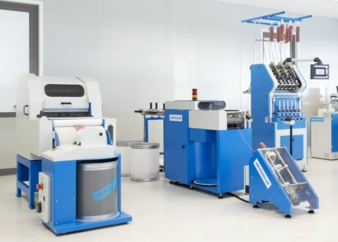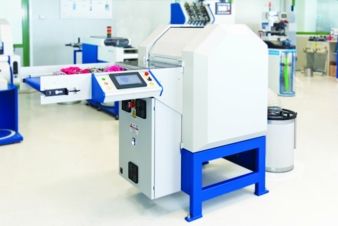26.07.24 – Textile recycling
Mesdan-Lab presents “Mini Spinning Line”
The Mesdan-Lab “Mini Spinning Line” facilitates small-scale trials of blending recycled and virgin fibres to identify optimal combinations for large-scale textile production, crucial for meeting international recycling directives and reducing environmental pollution in the textile industry, despite the challenges posed by fibre shortening during mechanical recycling.
With the purpose of reducing textile wastes and the consequent environmental pollution, international directives demand textile mills to use a certain percentage of recycled fibres in their spinning process. But the fabric shearing and shredding step, stresses the fibres, reduces their original length, and makes extremely difficult the spinning in a 100% recycled fibre composition. For the downstream processes, and particularly for the ring spinning technology, it results necessary the blending with virgin fibres, having a length that allows the spinning in the traditional machines. So, as well as the analysis of the recycled fibre features, the experimental study of the blending, testing fibres with different technical characteristics and blending them with different composition %, becomes crucial.
Efficient, small-scale fibre processing and testing
The Mesdan-Lab “Mini Spinning Line” allows to perform those trials in a small scale, by processing 20-50 g of fibres only, with small machines occupying a little space, consuming little power and raw materials and in very short time, permitting to perform different testing to identify the best blending approach to be then reproduced in the large production scale. The basic line (suitable for natural and man made, short and long fibres) includes a carding machine, a drawing and a ring spinning frames, but Mesdan can also offer an assembling and twisting machine, a winder and finally a circular knitting machine. It has been used for different purposes (didactic, melange sampling or small productions) but today is frequently used also for testing the spinnability of new natural fibres, not much used so far, naturally available and less polluting than the manmade fibres. Besides cotton, linen or hemp, other natural fibres of vegetable origin like, bamboo, ramie, abaca, kenaf, pineapple, milkweed, fibres derived from birch bark or coconut palm leaves and others have been processed.
Furthermore, the recent introduction of the “Laboratory Shredding Machine” opens the doors for the application of the “Mini Spinning Line” to the mechanical textile recycling. Small quantities of fabric wastes or trashed garments, can be processed to obtain fibres back again, for the lab scale recycling R&D projects or for other production purposes.


